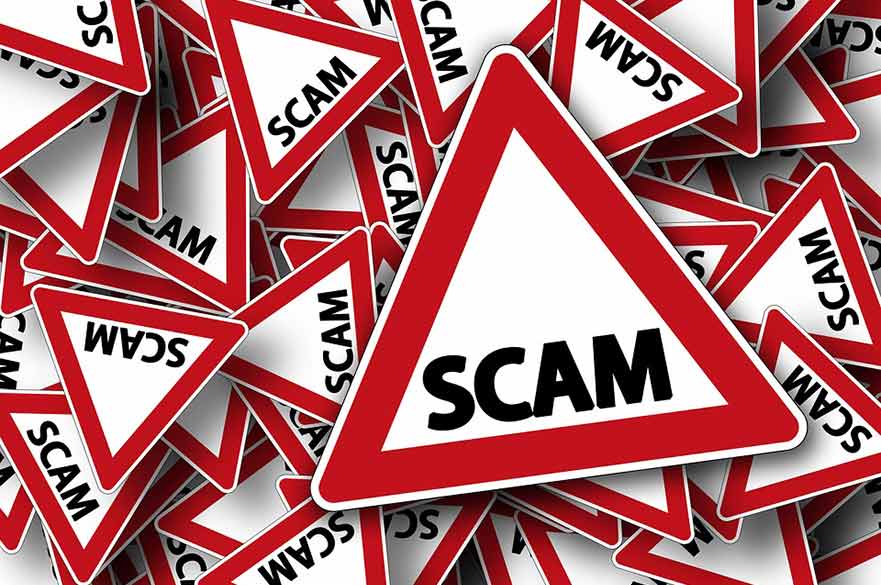Protect yourself from scams during the coronavirus outbreak
Published: 26 March 2020

Trading Standards has issued the following advice to help people be aware of a number of scams
It is a sad reality that there are some in our society who see the current Coronavirus crisis as way to exploit the vulnerable and make money. Our Trading Standards team has issued the following advice to help people be aware of a number of scams that have come to light and to stay safe:
Email scams
Phishing emails attempt to trick people into handing over information or to open emails with malicious attachments. Whilst these are nothing new there are some coronavirus-themed emails circulating at the moment.
- Emails claiming to be from the government and HMRC offering a tax rebate to support people through this challenging period.
- Emails claiming to be from WHO offering coronavirus safety advice. The attachment downloads a keylogger, allowing scammers to follow the online movements of the user and gain access to their device and personal details.
- Emails offering investment and trading advice to take advantage of the latest financial situation
The government, HMRC, WHO and banks will never ask you for your personal details or discuss any tax refunds over email. There are a number of other signs to look out for that can help identify a phishing email including:
- Is it addressed to you by name, or does it refer to a valued customer? This can be a sign that the sender doesn’t actually know you.
- Look at the senders name and email address. Do they sound legitimate?
- Were you expecting someone to get in touch, and does their offer seem too good to be true?
- Many phishing emails have poor grammar, punctuation and spelling.
Doorstep scams
Some fraudsters have approached people on their doorsteps offering a range of services.
- Anyone posing as a healthcare worker offering to carry out or sell you a home coronavirus test is a scam. This is not a service offered by the NHS or the government.
- Any companies or individuals offering cleaning services to help prevent the spread of coronavirus are a scam.
- Strangers offering to run errands for you so that you can stay at home could also be a scam.
If you are approached by individuals offering any of these services, you should take steps to protect yourself.
- If someone claims to be from the health service, public service or a utility service, ask to see their ID. Don’t let them into your house until you’ve checked their credentials. If they are genuine then they won’t mind.
- Don’t hand over cash to any strangers offering services. If you need help with errands, try and use family, neighbours or other trusted individuals.
- Make sure doors and windows are locked, even when you’re at home, and only answer the door to people you know.
- It is better to use trusted support channels rather than leaving notices in windows asking for help.
Phone scams
The government, council, NHS or other similar services will never ask you to disclose any personal information or make any payments over the phone. Similarly, banks will never call and ask for your PIN or to transfer money to another account. If you receive any calls like this, hang up and report it to the organisation.
We’ve also be made aware of ‘coronavirus update’ apps, claiming to provide updates on the virus. The fake app contains a form of ‘ransomware’, named CovidLock, which locks the phone and demands that the user pays a sum of money to unlock it. You will get the most reliable information from the Government website.
Online shopping scams
A lot of people have been ordering facemasks, hand sanitiser and other products that never arrive. Don’t be tempted by suspicious offers and adverts, and if you do any online shopping stick to well respected outlets.
We’ve also been made aware of unfair pricing on a number of in-demand goods, such as toilet roll and hand sanitiser, in a number of independent outlets. The Competition and Markets Authority (CMA) have stated that they will consider any evidence of companies breaking competition or consumer protection law and take direct action in appropriate cases. If you spot any retailers doing this you can report them to Trading Standards who will pass on your reports to the CMA.
It’s important that people look to official sources for information about the virus. If you think you’ve been targeted by a scam you can report it to Derby City Council or to the Police on 101, Facebook or Twitter.
There are a range of sources of support and information:
- The latest national COVID-19 updates and advice from the government.
- The latest updates on COVID-19 in Derby from Derby City Council
- Report fraud and cyber-crime to Action Fraud or call 0300 123 2040
- Derby City Council Trading Standards
- Citizens Advice
- Call Crimestoppers anonymously on 0800 555 111